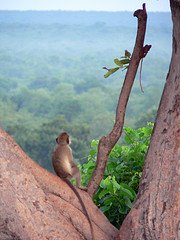An interesting essay that explores the ethics of using stem cells by comparison to war and animal slaughter:
RichardDawkins.net - The Richard Dawkins Foundation for Reason and Science
Sep 28, 2006
| [+/-] |
Cows, cruelty and collateral damage |
| [+/-] |
Would you do it to your dog? |
What are the costs when scientists (and their institutions) deny the sentience of animals? Well, there are the ethical costs of causing pain and suffering and/or turning a blind eye to same. There are also scientific costs when we cling to the flawed logic and deny some scientific evidence (e.g. animal emotions) in the pursuit of other evidence (e.g. animal models of child neglect and abuse). The following essay summarizes this duplicity in a succinct and compelling way by asking, "Would you do it to your dog?"
Would you do it to your dog?
Sep 26, 2006
| [+/-] |
How Brain's 'Mirrors' Aid Our Social Understanding - washingtonpost.com |
How Brain's 'Mirrors' Aid Our Social Understanding - washingtonpost.com
From the article:
"If we empathize with other human beings because of mirror neurons rather than rules, I know what it is for you to be sad because I know what it is to be sad myself," Glenberg said. "When I see you hurt, my mirror neuron system is responding; it is giving me a sense of pain."[emphasis added]
And by removing complex thinking from the ledges of abstraction and rooting it in the physical world, the research also helps show how the physical brain can produce the ephemera of thought. To Glenberg, it suggests that humans are far from alone in being sophisticated thinkers.
Research has shown -- in some ways more convincingly than in humans -- the role of mirror neurons in other animals.
"In fact, when I started investigating these things, I became a vegetarian," Glenberg said. "It became clear to me as a consequence of these theories of embodied cognition that virtually all animals are thinking, and it is difficult to draw a line between those who are thinking and those who aren't."
| [+/-] |
Elephant Man drug trial victims 'injected too quickly' | the Daily Mail |
I bet this guy hated being experimented on, too.
Elephant Man drug trial victims 'injected too quickly' the Daily Mail
| [+/-] |
Seed: New Study Finds Monkeys Hate Techno Too |
I bet they hate being kept in cages and experimented on even more!
Seed: New Study Finds Monkeys Hate Techno Too
Sep 20, 2006
| [+/-] |
Boston passes stiff biolab requirements - Boston.com |
Boston passes stiff biolab requirements - Boston.com
The vast majority of experiments with these pathogens involve animals - so any added oversight and call to transparency is good. I just fear this might not go far enough. If people saw video footage of the experiments, they'd probably not approve them.
Sep 16, 2006
Sep 11, 2006
| [+/-] |
Trim5, then siglecs, now LEDGF (p75) |
The repeated failure of HIV vaccines in humans after they have proven effective in other primates provides ample evidence that the nonhuman primate model is itself a tragic and miserable failure in vaccine development. Yet the animal trials continue while all the world holds its breath waiting for vaccines and cures as the death toll rises.
Why have these vaccines failed in humans? One team suggested that differences between monkeys and humans for the gene TRIM5-alpha played an important role. A few months later, we learned about critical differences between nonhuman primates and humans with respect to "siglecs," proteins which serve as the "brakes" on the immune system. And now, just a few short days ago, yet another set of investigators has found another critical difference : HIV uses a specific human protein (LEDGF-p75) to copy itself into the host genome and create an untouchable resevoir of its own genetic code.
Despite all of these differences, and this latest evidence of a human-specific disease mechanism, thousands of monkeys are being tortured and killed right now in government-funded experiments of SIV and SHIV.
ScienceDaily: Mayo Researchers Discover HIV Dependence On A Human Protein
Sep 8, 2006
| [+/-] |
Primates (including humans) in Peril: Post 9/11: The deadly danger of bioterrorism labs |
Post 9/11: The deadly danger of bioterrorism labs
Pandemic anyone?
Sep 6, 2006
| [+/-] |
The Chronicle: Journal Editor Quits Over Conflict of Interest |
Nemeroff has stepped down - but he hasn't resigned from the University. As long has he mixes industry and government money - especially federally-funded resources like the Yerkes National Primate Research Center, he will have an insurmoutable conflict of interest.
Like what this guy needs is a checklist to remind him to be ethical?
1. Take big money from industry
2. Take University salary
3. Take federal grant dollars
4. Do whatever I want
5. Use ghostwriter to compose results
6. Submit to journal where I am editor-in-chief to avoid any hassels
7. Go on safari
p.s.
8. Be an ethical and decent human being
9. Stop torturing primates
BAH!
The Chronicle: Daily News Blog: Journal Editor Quits Over Conflict of Interest
Sep 4, 2006
| [+/-] |
Social imitation in neonatal monkeys |
So if you take a monkey from his or her mother and make faces at it, sometimes they make similar faces back at you. But just for a week and a half or so. Hmmm. I wonder how many hundreds of thousands of dollars that cost. If one were really interested in social imitation, wouldn't one watch babies with thier own mothers instead of a monkey? Would a human baby imitate a monkey model?
For example. sticking the tongue out isn't a common monkey facial gesture (there are some species for which tongue antics constitute a mating signal, but I don't think it's the macaque). Lip smakcing is common, and it was imitated. Open mouth was not imitated. An open mouth, depending on how it is portrayed, is a threat...would it be wise to learn to respond to an open mouth threat with an open mouth threat as a baby?
Taking a baby from his mother is undeniably traumatic. What was done to these 21 baby monkeys? How did they respond to maternal separation? How did they respond to the manhandling and the procedure? That certainly needs to be taken into account when considering these results. Would a human baby ripped from his mother imitate an ape or monkey? Would we care?
When baby monkeys must be raised in a nursery environment for a clinical reason (e.g. the mother died) they are normally in an incubator during the first month of life (or thereabouts). These babies were subjected to batteries of tests on a daily basis during a time when they were particulalry vulnerable. This all seems like a terribly cruel way to treat baby monkeys to answer a rather nonsensical questions - particularly because one might be able to make relevant observations of wild or free-ranging animals to answer them.
Baby monkeys belong with their mothers and monkeys belong in their natural habitats.
Social imitation in neonatal monkeys

